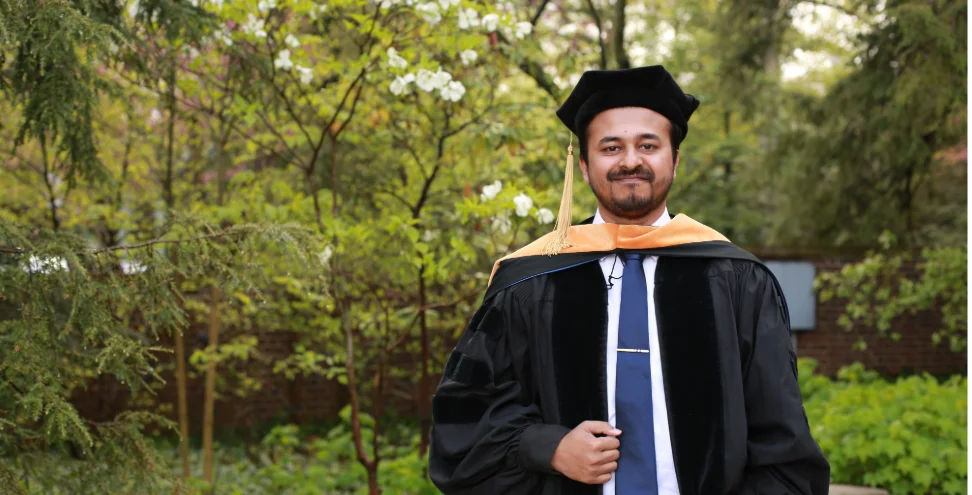Curriculum Vitae (CV) for Study Abroad: Format, Samples, and Writing Tips
Sulekha Study Abroad: From Expert Guidance to Global Opportunities.
- Comprehensive Guidance: Expert advice on universities, courses, and scholarships.
- Top Destinations: Insights into renowned study-abroad countries.
- Up-to-date data: Information on foreign entrance exams, deadlines & accreditation.
- Personal Growth: Cultural immersion, independence, and global perspective.
- Enhanced Support: NEHA Chatbot for instant answers and guidance.
- Expert Consultation: Personalized advice from verified professionals.
Applying to study abroad requires more than just academic scores and a Statement of Purpose. One of the most crucial documents students often overlook is a well-crafted Curriculum Vitae (CV). A well-written CV acts as your academic biography and plays a key role in shaping your application’s success.
Table of Contents
- What is a Curriculum Vitae (CV)?
- Why is a CV Important for Study Abroad?
- CV vs Resume: What’s the Difference?
- Common Formats of CVs for Students
- Essential Sections in a Study Abroad CV
- Writing Tips to Create a Strong CV
- Sample CV for Students Applying Abroad
- Mistakes to Avoid in an Academic CV
- Tools and Templates to Build Your CV
- Final Checklist Before Submitting Your CV
- FAQs
What is a Curriculum Vitae (CV)?
A Curriculum Vitae is a comprehensive document that details your academic background, qualifications, achievements, and relevant experiences. For students, it serves as a formal introduction to university admissions committees, research heads, or scholarship bodies. Especially for master’s or PhD programs, your CV demonstrates your readiness and suitability for the academic challenge.
Why is a CV Important for Study Abroad?
When applying to universities abroad, your CV showcases more than just academics. It reflects your internships, projects, research experience, leadership roles, and even language proficiency or extracurricular accomplishments. A strong CV helps distinguish your profile from hundreds of applicants with similar grades and test scores.
CV vs Resume: What’s the Difference?
While the terms CV and resume are often used interchangeably, there are key differences, especially in academic settings.
- A resume is concise (1-2 pages) and primarily used for jobs or internships.
- A CV is more detailed (2+ pages) and commonly required for academic applications, research positions, and graduate programs abroad.
- A resume focuses on skills and work experience, while a CV emphasizes academic background, projects, and research.
|
Feature |
Resume |
CV (Curriculum Vitae) |
|
Purpose |
Job or internship applications |
Academic or research-based applications |
|
Length |
1 page (max 2 for experienced candidates) |
2–3 pages or more based on academic history |
|
Content Focus |
Skills, achievements, work experience |
Academics, research, publications, projects |
|
Tone |
Highly customized for specific job roles |
Standardized, often chronological |
|
Usage in Study Abroad |
Rarely used unless for job-based programs |
Commonly used across most academic applications |
|
Detail Level |
Brief and to the point |
Detailed and descriptive |
Common Formats of CVs for Students
There are three main formats students can use when applying to study abroad:
· Chronological CV: Lists academic history and achievements in reverse chronological order. Ideal for students with a strong academic record.
· Functional CV: Focuses on skills and competencies rather than a timeline. Suitable for students with limited work or academic experience.
· Combination CV: Blends both functional and chronological elements. Best for students who have a mix of academic, project-based, and internship experience.
Essential Sections in a Study Abroad CV
A CV for international university applications should include the following sections:
1. Personal Information
Name, contact details, LinkedIn profile, and optionally, nationality or languages spoken.
2. Academic Background
Details of all qualifications including institution names, degrees, subjects, duration, and grades or CGPA.
3. Projects or Research Work
Any major academic projects, dissertations, or papers published.
4. Internships or Work Experience
Include company names, roles, durations, and responsibilities.
5. Skills
Technical skills, languages known, and tools/software proficiency relevant to your field.
6. Achievements or Certifications
Awards, scholarships, online course certifications, or recognitions.
7. Co-curricular or Extracurricular Activities
Leadership positions, volunteer work, or participation in clubs and events.
How to Write an Impressive CV: Tips and Tricks
Here are some expert tips for students to craft a winning CV:
- Tailor your CV for each university or course.
- Use clear fonts like Calibri or Times New Roman and keep formatting consistent.
- Use bullet points to highlight key achievements.
- Quantify outcomes where possible (e.g., “Increased project efficiency by 30%”).
- Keep the CV concise, ideally 1–2 pages for undergraduate students, and up to 3 pages for master’s or PhD applicants.
Sample CV for Students Applying Abroad
Here’s a sample format you can follow:
[Name]
[Email] | [Phone] | [LinkedIn] | [City, Country]
Objective
Motivated undergraduate student seeking admission to a Master’s program in Data Science. Interested in machine learning research and real-world applications in data-driven decision-making.
Education
B.Tech in Computer Science – XYZ University – 2019–2023
CGPA: 8.7/10
Projects
Title: Predictive Analytics using Python
Summary: Developed a machine learning model to predict student performance using Scikit-learn.
Internships
Data Analyst Intern – ABC Corp – Jan 2022 to Mar 2022
Worked on Excel automation and dashboards using Power BI.
Skills
Python, R, SQL, Excel, Tableau, Data Visualization
Certifications
Google Data Analytics Certification – Coursera – 2022
Achievements
Runner-up at National Level Hackathon, 2022
Languages
English, Hindi, French (Basic)
Mistakes to Avoid in an Academic CV
- Including unnecessary personal details like marital status or religion.
- Using casual fonts or inconsistent formatting.
- Exaggerating achievements or false information.
- Submitting the same CV to all universities without tailoring.
- Skipping proofreading; grammatical errors can reduce credibility.
Tools and Templates to Build Your CV
There are several free tools and templates available for students:
- Canva – offers visually appealing and editable CV templates.
- Zety – customizable templates with export options.
- Europass – ideal for students applying in Europe.
- Overleaf – LaTeX-based CV templates preferred in research fields.
Final Checklist Before Submitting Your CV
- Have you tailored your CV for the specific university and course?
- Is the formatting clean and consistent?
- Have you proofread for grammar and spelling errors?
- Are the most relevant details listed in the top sections?
- Have you saved the file in PDF format with a professional name? (e.g., Firstname_Lastname_CV.pdf)
FAQs on CV for Study Abroad Applications
1. What is the ideal length of a CV for study abroad?
A study abroad CV is typically 1–2 pages long. However, if you have extensive academic or research experience, it can extend to 3 pages. The focus should be on relevant and recent information.
2. Is a CV mandatory for all study abroad applications?
Not all programs require a CV, but most postgraduate and research-based programs do. It’s best to check the specific university’s requirements before applying.
3. Should I include a photo in my CV?
Most universities abroad, especially in the US and UK, prefer CVs without photos. However, some European countries may expect it. Always follow the country-specific or university-specific guidelines.
4. How is an academic CV different from a job resume?
An academic CV is more detailed and focuses on your educational background, research, and publications. A resume, on the other hand, is concise and tailored for specific job roles.
5. Can I add internships and part-time jobs to my CV?
Yes, especially if they are relevant to your academic interests. Include internships, part-time roles, or volunteering that showcase transferable skills or domain experience.
6. What font and format should I use for a study abroad CV?
Use professional fonts like Times New Roman, Arial, or Calibri with 11–12 pt size. Maintain consistent formatting, bullet points for clarity, and avoid using colors or fancy designs.
7. Is it okay to include my school-level achievements?
Only include school-level achievements if they are significant, recent, or related to the program you are applying for. Focus more on undergraduate and postgraduate accomplishments.
8. How do I write a CV if I have no research experience?
Emphasize your academic projects, relevant coursework, internships, and skills. You can also include seminars, certifications, and any independent learning you've done.
9. Can I use the same CV for every university application?
It’s better to customize your CV slightly for each university. Align your academic goals and experiences with what each program values to increase your chances of selection.
Recently Added Study Abroad Blogs
- Accountancy-At-University-Of-Newcastle-Australia-Uon-Australia
- Tufts-University-Rankings-Courses-Admission-Fees-Scholarships-And-Placements
- Medicine-At-Griffith-University-Australia
- Accountancy-At-University-Of-Southern-Australia-Unisa-Australia
- Automotive-At-Massachesetts-Institute-Of-Technology-Mit-Usa
- Economics-At-University-Of-Oxford-Uk
- University-Of-Newcastle-Rankings-Courses-Admission-Fees-Scholarships-And-Placements
- University-Of-Lethbridge-Rankings-Courses-Admission-Fees-Scholarships-And-Placements
-
NehaAnswered on 09/04/2024
To study MBA in the USA, you need to follow these steps: 1. Research and select the universities you want to apply to based on your preferences and eligibility. 2. Take the required exams such as GMAT or GRE, and TOEFL or IELTS if you are an international student. 3. Prepare a strong application package including transcripts, essays, letters of recommendation, and resume. 4. Apply to the universities of your choice following their application deadlines and instructions. 5. Upon acceptance, apply for a student visa and make necessary travel arrangements. Please note that the specific requirements and procedures may vary by university, so it is important to carefully review the information provided by each institution.
(5)(3)Have questions about studying abroad? Ask NEHA, your study abroad companion!
Top Study Abroad Consultants
-
P
Services: Study Abroad,Foreign education entrance exam coaching
About:Established in 2018, Walk International provides a Read moreEstablished in 2018, Walk International provides a holistic approach to overseas education for students pursuing UG, PG, and Doctorate degrees. The coaching covers IELTS, TOEFL, GRE, and GMAT for the UK, USA, Canada, Australia, France, and other English-speaking countries. Walk International is also an authorized test registration center for British Council. Students can also get counseling and efficient processing of visas and documents for enrollment.
-
G
Services: Study Abroad
About:Global Study Link (GSL), established in 2008, oper Read moreGlobal Study Link (GSL), established in 2008, operates in India and the UK, offering expert guidance to students for international education. With over 15 years of experience, their dedicated team assists students in achieving academic and career goals through personalized counselling, application support, admissions assistance, visa and scholarship guidance, and post-arrival help. GSL's deep understanding of global education systems helps students navigate the complexities of studying abroa
-
T
Services: Study Abroad,Foreign language training,Foreign education entrance exam coaching
About:At Texas Review, we help students turn their globa Read moreAt Texas Review, we help students turn their global dreams into reality. With expert guidance, personalized counselling, and end-to-end support, we specialize in Study Abroad Consulting and Test Preparation for exams like IELTS, TOEFL, GRE, GMAT, SAT, PTE, and OET. Our team of certified trainers and experienced counsellors assist students in securing admissions to top universities worldwide – including the Ivy League (USA), Russell Group (UK), Group of 8 (Australia), and TU9 (Germany). Why Cho
Review: I had a wonderful experience with Texas Review! They supported me throughout my journey, right from preparing for GMAT and IELTS to handling my entire admission process. I am really happy to share that I got admitted to Queen Mary University of London, and this wouldn’t have been possible without their guidance. The team helped me with everything SOPs, loan process, visa filing, accommodation arrangements, and complete admission support. Special thanks to Teena Ma’am and her entire team for their constant support, patience, and guidance at every step. I truly recommend Texas Review to anyone planning to study abroad their expertise and personal attention make the whole process smooth and stress free.
-
C
Services: Study Abroad,Foreign education entrance exam coaching
About:Consigner Overseas Education Private Limited was e Read moreConsigner Overseas Education Private Limited was established in 2015 and has been a leading organization in the study abroad field. Priya Kohli and Ravi Gosain are the directors of this organization. They have a dedicated team of qualified immigration experts with expertise in the study permit and immigration procedures of the countries, i.e., USA, UK, Germany, Canada, Australia, and New Zealand.
Review: “The service was excellent and very professional. The team was polite, trustworthy, and ensured everything was handled smoothly. Highly satisfied with the overall experience
-
K
Services: Study Abroad
About:Keemaya Overseas Education Services is a leading e Read moreKeemaya Overseas Education Services is a leading educational consultancy that empowers students to explore global learning opportunities. With a vast network of 250+ universities spanning countries like Germany, Holland, Denmark, Poland, Hungary, Sweden, France, and more, they specialize in personalized guidance for aspiring students. Their mission is to match students' profiles with the right institutions and destinations, ensuring a seamless transition to international education. Their exp
Review: I got an instant call and set my meeting.
-
N
Services: Study Abroad
About:New Dawn Overseas Services is a top educational co Read moreNew Dawn Overseas Services is a top educational consultancy that specializes in guiding students towards higher education opportunities abroad. Committed to facilitating access to esteemed international institutions, they offer comprehensive services tailored to each student's needs. Their experienced consultants provide personalized assistance in university selection, course counseling, and application processes, ensuring a smooth journey toward academic success. Focusing on student well-be
Review: I am writing on the basis of my first interactions. It is good so far to get in touch with the agency. Feels helpful.
-
I
Services: Study Abroad
About:Infocus Overseas Education Consultants, headquarte Read moreInfocus Overseas Education Consultants, headquartered in New Delhi, India, is a leading overseas education consultancy. Their mission is to simplify the study abroad process for aspiring students. They offer free professional career counseling to Indian students aiming for higher education in countries like Canada, New Zealand, the USA, Australia, and the UK. With a wide array of programs, colleges, and universities, they guide students in choosing the right course and institute. They offer a wi
Review: ndjdjene shrines skndjdbebs d
-
S
Services: Study Abroad,Visa consultants,Foreign education entrance exam coaching
About:Bridging Immigrations is a reputable Canadian immi Read moreBridging Immigrations is a reputable Canadian immigration and settlement firm with established offices in Toronto /Ontario, Canada with a satellite office in New Delhi / India. Our firm specializes in assisting professionals and business individuals in successfully immigrating and settling in Canada, aiming to offer them a better future and enhanced quality of life. It is Led by Vinod Kumar and Pankaj Kapoor, both licensed experts recognized by the Immigration, Refugees and Citizenship Canada (I
Review: My experience with Bridging Immigration was wonderful. The team gave me clear guidance throughout, and Ritu was especially amazing with visa counselling patient, supportive, and always ready to help. The whole process felt smooth and stress-free. Highly recommended!
-
I
Services: Study Abroad,Visa consultants,Educational Consultants
About:Innvictis Solutions LLP is a leading student visa Read moreInnvictis Solutions LLP is a leading student visa consultancy in North India. Their goal is to support every learner, every learning professional, education institute and recruitment organizations through our work. It has tried to dispel the myths associated with abroad studies and internships by simplifying the procedures through technology resourcing and knowledge consulting with institutions and agencies alike. To date, many students have successfully gone to different countries through our c
-
T
Services: Study Abroad,Visa consultants
About:THE SS INTERNATIONAL boasts eight years of dedicat Read moreTHE SS INTERNATIONAL boasts eight years of dedicated experience in facilitating immigration, study abroad, permanent residency, and visa procedures for various countries, including Canada, Australia, and Germany. With a team of ten experts, they offer personalized guidance tailored to each client's unique requirements and aspirations. Setting themselves apart, they prioritize client interests over commissions from educational institutions, ensuring unbiased advice for optimal decision-making
Review: ?? Many heartfelt blessings to THE SS INTERNATIONAL! ?? With your dedicated efforts and expert guidance, I successfully received my Singapore visa. I am truly grateful to the entire team for making my dream come true. May your company continue to grow and help many more people achieve their aspirations. Wishing you all endless success, prosperity, and countless visa approvals ahead. ???
-





.png)
.png)





